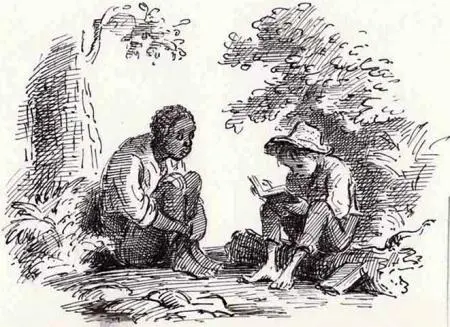Language is always evolving, and that’s never more evident than with the written word. Dialogue that was once tolerable, if not risqué, does not fly today, hence the repeated controversies over the likes of Mark Twain's The Adventures of Huckleberry Finn in the classroom. But when stories written today are period pieces, should a writer portray the language of the time with 100% authenticity in terms of hate speech?
Two recent books released in a politically correct Western World use this method of setting the story in the past, and in the process have problematic treatment not just of African-Americans but also homosexuals. These books are Those Across the River (2011) by Christopher Buehlman and City on Fire (2015) by Garth Risk Hallberg. The former is set in the 1930s while the latter is set in the late 1970s. By examining the use of language, it can be determined whether or not the two authors justify its inclusion.
What Buehlman has in common with Hallberg is Those Across the River was his first published novel. Released five years ago, in the time since he has released four more: Between Two Fires, The Necromancer’s House, The Lesser Dead and The Suicide Motor Club. Setting stories in the past is often his predilection, although he tends to alternate eras. Between Two Fires, for instance, is set in 1348 while The Lesser Dead takes place in 1978. Since he gravitates toward horror, there is an allure to framing stories in the pre-telecommunications age, where smartphones and laptops weren’t obvious workarounds for characters stuck in dire situations.
Hallberg, meanwhile, doesn’t have an oeuvre to go by as he’s only published one book. What is known about the man is he was born in Baton Rouge, Louisiana and grew up in Greenvile, North Carolina. This is a bit shocking, considering his debut novel is acclaimed for encapsulating New York the way other classic authors like F. Scott Fitzgerald or J.D. Salinger have. But he does live in New York City now, and perhaps his research pinpointed this span of years to be both important for the past and future of the Big Apple. As Michiko Kakutani states in her New York Times review, “For Mr. Hallberg, the ‘70s were a sort of inflection point for New York — when its fate seemed as bleak as Detroit’s would be decades later, and before a bubble of wealth encased much of the city.”
Those Across the River follows Frank Nichols and his new wife Eudora as they move to Whitbrow, a small Georgia town, in 1935. Frank has been disgraced from his teaching career after an affair with Eudora, and broke and aimless this is his last resort. He’s inherited a house and decides he’ll write a history on his family’s old estate, the Savoyard Plantation, including its legacy of slavery and sadistic ancestry. The town, however, has a dark secret and seems to be entrenched in strange, old pagan practices to appease a dark presence in the woods. As they decide to stop paying tribute, horrible things occur that are tied to Frank’s past and the Savoyard Plantation.
The scene in question in Those Across the River involves Frank and Eudora encountering a black man in the small downtown area of Whitbrow. Frank is in a general store with his less enlightened friends, and afterwards thinks to himself, “I was about to mention the Negro who came into the general store, but what was there to tell? A well-mannered colored man had come to the general store to buy salt, and when he left, the Southern gentlemen had mocked him and told stories about him.” The stories, of course, involve saying of the man specifically: ‘“Ain’t no Chalk Ridge nigger built like that,” Old Man Gordeau said. “They all got the pee-lagra. Look like scarecrows and can’t hardly lift their heads. Don’t think he’s no squatter neither.”’ Charming, although some of the Southerners do speak up about how his money is as good as anyone else’s. And while Frank is a little condescending, he’s at least open-minded for the time period.
When Frank meets with Eudora, however, the man follows the pair and stares at Eudora specifically, who is described as being very beautiful. Frank tells the man off, and although he doesn’t say it aloud, he thinks to himself, “Unbidden, the word nigger rose up in my head and almost pushed its way into my mouth.” Even with the introspection, he doesn’t feel any guilt about this the way the character would be written if the story took place in 2016.
Of course, later in the novel the drifter turns out to be Hector, the leader of a werewolf clan, and subjects Frank to many forms of torture and humiliation. There’s an ironic subversion, as he tells Frank several times, “You are most definitely my nigger now.” But even then Hector’s aligned with animalistic tendencies, and forces himself on Eudora in such a way as to play into racial stereotypes of fearing that black men are out to rape white women.

City on Fire, by comparison, is Robert Altman-esque in its multitude of characters. It starts with a shooting on New Year’s Eve, 1976 and spans, along with numerous dips into the past, up to July 13, 1977 when New York City experienced a blackout. Regan and William Hamilton-Sweeney are the heirs to a great fortune, and are the center of the spider web. Regan is getting a divorce from Keith while William is partners with Mercer. Regan and Keith are having trouble because Keith was having an affair with Samantha, who is friends with Charlie, who is a big fan of William’s punk band. All of this is flanked by an obsessive magazine reporter and a hopeful detective.
So it's understandable that the '70s were different times. Desegregation had only existed for about 10 years, and that’s felt with the character of Mercer. Women were still struggling (and still are) to gain respect in the world and particularly in the workplace, and that’s dramatized with Regan on the board of her father’s business. And homosexuality, as it is today, was still taboo but to an even more extreme degree. William and Mercer, for instance, are a couple but keep it from their families and from most of the world at large. So when they experience prejudice it’s the kind of thing that would more than likely be experienced today. Their oppressors, however, would be viewed as “less evolved”.
But what makes City on Fire questionable in its attempt to recreate the authenticity of the time period is the more insidious forms of prejudice, such as with Charlie. There’s one particular scene where Charlie is reminiscing back to he and Sam hanging out: “Before he’d gotten busted, they used to hang out here eating ice cream and ‘ludes and drinking her dad’s whisky. Half-bombed in the afternoon, he’d goof on the homos passing into the sex shops, as away to the south, buildings rose like kingdoms.” It’s how casual the moment is, showing how even Charlie being in a disenfranchised community, two in the case of Jews and punks, can still flippantly think these kinds of thoughts. And it’s telling that it’s, much like Frank Nichols, just thoughts and nothing he acts on.
Contrast this against the punk rocker William, Billy Three-Sticks, who appropriates and weaponizes words that would be used against him. In a flashback to him dodging the draft for the Vietnam War, he comes on to the recruiter:
“Sergeant, what do I have to do to prove that I’m a fag?” What, indeed, was he doing? He was reaching forward, touching the man’s hand. “If necessary, we could go somewhere more private…” The din of typewriter keys seemed to die down. In a lower voice, he added, “Not that I’m attracted to you personally, you understand, but in the name of science—”
Then a bright pain buzzed in his ear, where the sergeant had struck him. “There are rules here, son,” he said, a minute later.
In this instance William is the one in control, even when he’s being assaulted, and only proving the frailty of societal norms. This is part of his whole chaotic shtick, and he’s in fact one of the few characters that doesn’t hide his lifestyle to the greater world. He does, however, keep his private vices, like drug abuse, from those he loves, so he’s not some saint.
So does setting their stories in the past give Buehlman and Hallberg a free pass? Those Across the River reads at times like it’s holding back. Frank comes across as too, to use the parlance of the young folks these days, “woke” for his own good. Perhaps him actually vocalizing the dreaded word would lend Hector’s cruelty later more weight. Instead, Hector comes across as malevolent rather than the righteous figure of comeuppance that he should be. Hallberg’s take on teenagers, however unfortunate, does indeed ring of authenticity. “It was a different time,” one might say, but not so long ago that it’s unrelatable. That being said, Buehlman’s 1930s is not so unlike modern America’s underbelly that has been revealed by this current election cycle.
There’s no easy answer to a situation like this. The United States used to be a close-minded place, and still is in many ways. The past can’t be glossed over, and a justification for period pieces is to capture a moment in time. But capturing that moment means not abusing it and using it as an excuse for indulgence. It also, simultaneously, can feel compromised if an author doesn’t fully commit with their characters. The only real answer is an author must always be sensitive to this kind of situation, and use it as a conversation starter rather than the punctuation on a sentence.

About the author
A professor once told Bart Bishop that all literature is about "sex, death and religion," tainting his mind forever. A Master's in English later, he teaches college writing and tells his students the same thing, constantly, much to their chagrin. He’s also edited two published novels and loves overthinking movies, books, the theater and fiction in all forms at such varied spots as CHUD, Bleeding Cool, CityBeat and Cincinnati Magazine. He lives in Cincinnati, Ohio with his wife and daughter.








